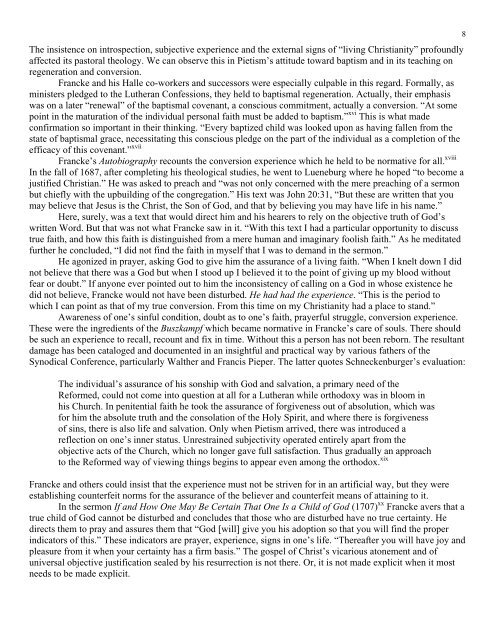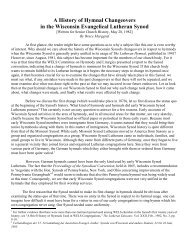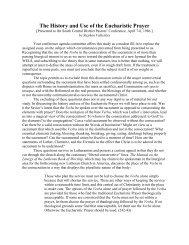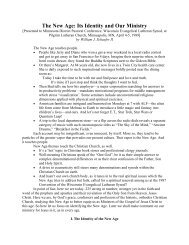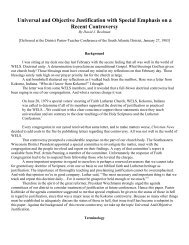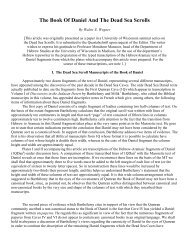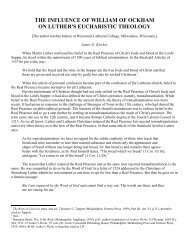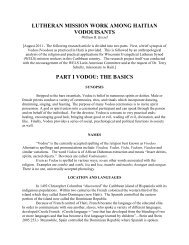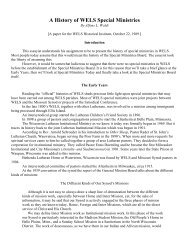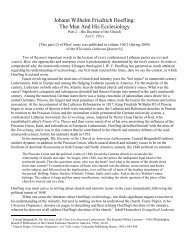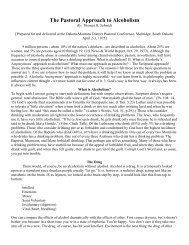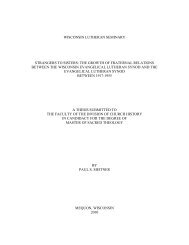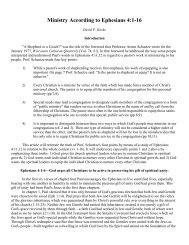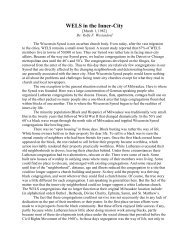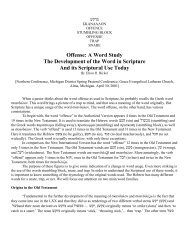Pietism's Teaching on Church and Ministry - Wisconsin Lutheran ...
Pietism's Teaching on Church and Ministry - Wisconsin Lutheran ...
Pietism's Teaching on Church and Ministry - Wisconsin Lutheran ...
Create successful ePaper yourself
Turn your PDF publications into a flip-book with our unique Google optimized e-Paper software.
The insistence <strong>on</strong> introspecti<strong>on</strong>, subjective experience <strong>and</strong> the external signs of “living Christianity” profoundly<br />
affected its pastoral theology. We can observe this in Pietism’s attitude toward baptism <strong>and</strong> in its teaching <strong>on</strong><br />
regenerati<strong>on</strong> <strong>and</strong> c<strong>on</strong>versi<strong>on</strong>.<br />
Francke <strong>and</strong> his Halle co-workers <strong>and</strong> successors were especially culpable in this regard. Formally, as<br />
ministers pledged to the <strong>Lutheran</strong> C<strong>on</strong>fessi<strong>on</strong>s, they held to baptismal regenerati<strong>on</strong>. Actually, their emphasis<br />
was <strong>on</strong> a later “renewal” of the baptismal covenant, a c<strong>on</strong>scious commitment, actually a c<strong>on</strong>versi<strong>on</strong>. “At some<br />
point in the maturati<strong>on</strong> of the individual pers<strong>on</strong>al faith must be added to baptism.” xvi This is what made<br />
c<strong>on</strong>firmati<strong>on</strong> so important in their thinking. “Every baptized child was looked up<strong>on</strong> as having fallen from the<br />
state of baptismal grace, necessitating this c<strong>on</strong>scious pledge <strong>on</strong> the part of the individual as a completi<strong>on</strong> of the<br />
efficacy of this covenant.” xvii<br />
Francke’s Autobiography recounts the c<strong>on</strong>versi<strong>on</strong> experience which he held to be normative for all. xviii<br />
In the fall of 1687, after completing his theological studies, he went to Lueneburg where he hoped “to become a<br />
justified Christian.” He was asked to preach <strong>and</strong> “was not <strong>on</strong>ly c<strong>on</strong>cerned with the mere preaching of a serm<strong>on</strong><br />
but chiefly with the upbuilding of the c<strong>on</strong>gregati<strong>on</strong>.” His text was John 20:31, “But these are written that you<br />
may believe that Jesus is the Christ, the S<strong>on</strong> of God, <strong>and</strong> that by believing you may have life in his name.”<br />
Here, surely, was a text that would direct him <strong>and</strong> his hearers to rely <strong>on</strong> the objective truth of God’s<br />
written Word. But that was not what Francke saw in it. “With this text I had a particular opportunity to discuss<br />
true faith, <strong>and</strong> how this faith is distinguished from a mere human <strong>and</strong> imaginary foolish faith.” As he meditated<br />
further he c<strong>on</strong>cluded, “I did not find the faith in myself that I was to dem<strong>and</strong> in the serm<strong>on</strong>.”<br />
He ag<strong>on</strong>ized in prayer, asking God to give him the assurance of a living faith. “When I knelt down I did<br />
not believe that there was a God but when I stood up I believed it to the point of giving up my blood without<br />
fear or doubt.” If any<strong>on</strong>e ever pointed out to him the inc<strong>on</strong>sistency of calling <strong>on</strong> a God in whose existence he<br />
did not believe, Francke would not have been disturbed. He had had the experience. “This is the period to<br />
which I can point as that of my true c<strong>on</strong>versi<strong>on</strong>. From this time <strong>on</strong> my Christianity had a place to st<strong>and</strong>.”<br />
Awareness of <strong>on</strong>e’s sinful c<strong>on</strong>diti<strong>on</strong>, doubt as to <strong>on</strong>e’s faith, prayerful struggle, c<strong>on</strong>versi<strong>on</strong> experience.<br />
These were the ingredients of the Buszkampf which became normative in Francke’s care of souls. There should<br />
be such an experience to recall, recount <strong>and</strong> fix in time. Without this a pers<strong>on</strong> has not been reborn. The resultant<br />
damage has been cataloged <strong>and</strong> documented in an insightful <strong>and</strong> practical way by various fathers of the<br />
Synodical C<strong>on</strong>ference, particularly Walther <strong>and</strong> Francis Pieper. The latter quotes Schneckenburger’s evaluati<strong>on</strong>:<br />
The individual’s assurance of his s<strong>on</strong>ship with God <strong>and</strong> salvati<strong>on</strong>, a primary need of the<br />
Reformed, could not come into questi<strong>on</strong> at all for a <strong>Lutheran</strong> while orthodoxy was in bloom in<br />
his <strong>Church</strong>. In penitential faith he took the assurance of forgiveness out of absoluti<strong>on</strong>, which was<br />
for him the absolute truth <strong>and</strong> the c<strong>on</strong>solati<strong>on</strong> of the Holy Spirit, <strong>and</strong> where there is forgiveness<br />
of sins, there is also life <strong>and</strong> salvati<strong>on</strong>. Only when Pietism arrived, there was introduced a<br />
reflecti<strong>on</strong> <strong>on</strong> <strong>on</strong>e’s inner status. Unrestrained subjectivity operated entirely apart from the<br />
objective acts of the <strong>Church</strong>, which no l<strong>on</strong>ger gave full satisfacti<strong>on</strong>. Thus gradually an approach<br />
to the Reformed way of viewing things begins to appear even am<strong>on</strong>g the orthodox. xix<br />
Francke <strong>and</strong> others could insist that the experience must not be striven for in an artificial way, but they were<br />
establishing counterfeit norms for the assurance of the believer <strong>and</strong> counterfeit means of attaining to it.<br />
In the serm<strong>on</strong> If <strong>and</strong> How One May Be Certain That One Is a Child of God (1707) xx Francke avers that a<br />
true child of God cannot be disturbed <strong>and</strong> c<strong>on</strong>cludes that those who are disturbed have no true certainty. He<br />
directs them to pray <strong>and</strong> assures them that “God [will] give you his adopti<strong>on</strong> so that you will find the proper<br />
indicators of this.” These indicators are prayer, experience, signs in <strong>on</strong>e’s life. “Thereafter you will have joy <strong>and</strong><br />
pleasure from it when your certainty has a firm basis.” The gospel of Christ’s vicarious at<strong>on</strong>ement <strong>and</strong> of<br />
universal objective justificati<strong>on</strong> sealed by his resurrecti<strong>on</strong> is not there. Or, it is not made explicit when it most<br />
needs to be made explicit.<br />
8


